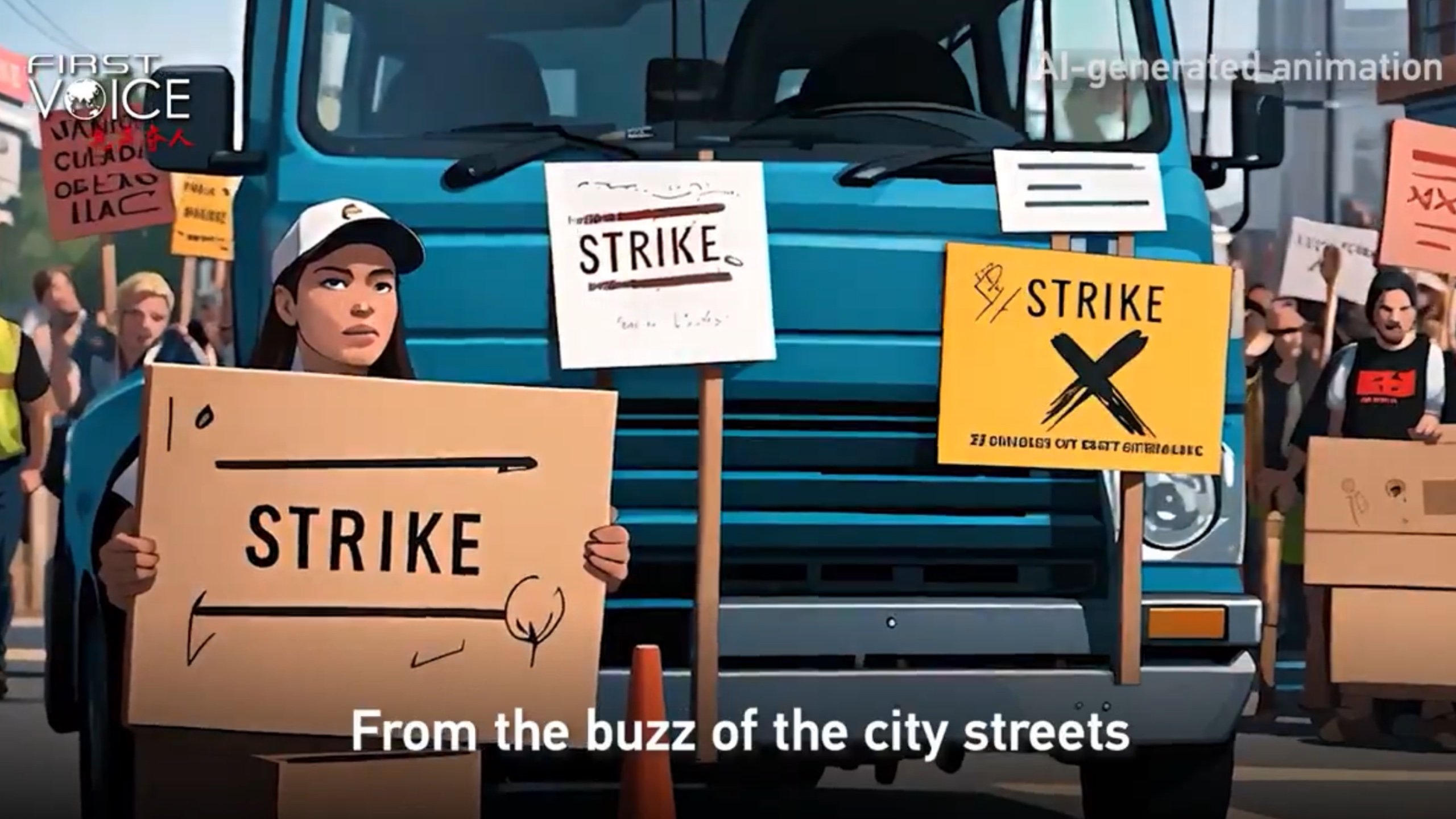
The A Fractured America series on Chinese state media demonstrates how AI is starting to influence Beijing’s influence operations.
China’s state broadcaster CGTN has launched an animated series that scrutinizes the United States and portrays it as a country in decline, in a startling example of the use of technology for propaganda.
Also read: Frost Giant Studios Considers AI Voices for Upcoming Game
Artificial intelligence is used in the “A Fractured America” series to produce content that challenges the viability of the “American Dream.”
China is using AI to attack America we need to start using the technology to defend democracy.https://t.co/T08cBMMmff via @AJEnglish
— Michael Ron Bowling (@mrbcyber) March 29, 2024
CGTN’s animated analysis
The series includes a video titled “American Dream or American Mirage,” which explores controversial topics in the US, such as drug addiction, incarceration rates, and the growing wealth and poverty gap, according to an Aljazeera report. With a backdrop evoking stormy skies over New York City, the animation ends with a critique of the American ideal, implying that it is out of reach for many.
These artificial intelligence (AI)-generated videos emphasize technological advancements in propaganda production with their stylized aesthetic and synthesized audio. As stated by the Aljazeera report, “The series exemplifies how artificial intelligence can streamline and economize content creation, allowing for rapid dissemination of tailored narratives,” according to Henry Ajder, a UK-based expert in generative AI.
American workers in Tumult: A result of unbalanced politics and economy #FirstVoice pic.twitter.com/JMYTyN8P2O
— CGTN (@CGTNOfficial) March 17, 2024
‘Fifty cent army’
China has been conducting influence operations worldwide for a long time on the internet, and its efforts are becoming more concentrated on social media platforms. The series is a reflection of Beijing’s continuous effort to portray itself as gaining prominence in the world while portraying the US as in decline. This story has been repeated on several Chinese state media platforms, which use artificial intelligence (AI) to produce more interesting and realistic-looking content.
The term “wumao,” or “fifty cent army,” describes China’s extensive online user base, which consists of people who either work for the Chinese government or volunteer to spread pro-government ideas and have an impact on online debates. Though the actual compensation, if any, can vary, the term “wumao” (五毛), which translates to “fifty cents,” is derived from the alleged payment these users receive per post.
More than 10 years ago, #China‘s massive online troll army, called “wumao,” gained notoriety for overflowing the internet praising #CCP & now #CCP uses #AI in its propaganda to attack the “American Dream.” China is becoming better, but only in terms of “propaganda.” @HKokbore 1/2 pic.twitter.com/9kvvNROgaA
— Freya Griffiths (@FreyaGriff21) March 30, 2024
There are many different social media platforms, forums, and comment sections on news websites where the wumao operates. Their actions include posting flattering remarks about the government, disseminating false information, assaulting CCP critics, and occasionally starting campaigns of cyberbullying against dissidents.
However, the wumao’s presence supports a regulated and censored internet environment that serves the CCP’s objectives by influencing public opinion, stifling opposition, and fostering these outcomes. The influence and strategies of the wumao are expected to change and grow as digital platforms advance and take center stage in international discourse, positioning them as major player in the field of international information warfare.
US and Taiwan in the crosshairs
Beijing’s digital influence campaigns are primarily aimed at Taiwan, which recently elected William Lai Ching-te as president, and the US, which is dealing with its electoral challenges, according to the Aljazeera report. The creation of AI-generated content and deepfake videos during Taiwan’s election highlights how information warfare is constantly changing.
The emergence of artificial intelligence (AI) and its application to producing lifelike content has made it extremely difficult to determine the legitimacy of digital content. Microsoft has observed that it is becoming more challenging to distinguish between state-sponsored content and AI-generated images that are receiving a lot of interaction from actual social media users. Concerns regarding the integrity of public discourse are raised by the potential for AI to strengthen astroturfing tactics, which fabricate a false impression of broad consensus on divisive issues, particularly in the run-up to elections.
- SEO Powered Content & PR Distribution. Get Amplified Today.
- PlatoData.Network Vertical Generative Ai. Empower Yourself. Access Here.
- PlatoAiStream. Web3 Intelligence. Knowledge Amplified. Access Here.
- PlatoESG. Carbon, CleanTech, Energy, Environment, Solar, Waste Management. Access Here.
- PlatoHealth. Biotech and Clinical Trials Intelligence. Access Here.
- Source: https://metanews.com/china-mocks-fractured-america-in-new-ai-animation/
- :has
- :is
- :where
- 10
- 12
- 17
- 29
- 30
- 7
- a
- About
- According
- actions
- actual
- addiction
- advance
- advancements
- aesthetic
- against
- ago
- AI
- aimed
- alleged
- Allowing
- america
- American
- an
- and
- animation
- any
- Application
- ARE
- Army
- artificial
- artificial intelligence
- Artificial intelligence (AI)
- AS
- At
- attack
- audio
- backdrop
- base
- becoming
- been
- Better
- between
- broad
- but
- by
- called
- Campaigns
- CAN
- ccp
- censored
- cent
- Center
- center stage
- cents
- challenges
- challenging
- change
- changing
- China
- Chinas
- chinese
- City
- comment
- Compensation
- Concentrated
- Concerns
- conducting
- Consensus
- considers
- consists
- constantly
- content
- content-creation
- continuous
- continuous effort
- controversial
- country
- creation
- Critics
- dealing
- debates
- Decline
- Democracy
- demonstrates
- Derived
- describes
- Determine
- different
- difficult
- digital
- Digital Content
- discourse
- distinguish
- dream
- drug
- during
- economy
- effort
- efforts
- either
- elected
- Election
- Elections
- emergence
- emphasize
- ends
- Environment
- example
- exemplifies
- expected
- expert
- explores
- extensive
- extremely
- false
- field
- For
- forums
- fostering
- from
- gained
- gaining
- gap
- giant
- Government
- Grow
- Growing
- Have
- henry
- highlights
- How
- HTTPS
- ideal
- ideas
- if
- images
- Impact
- in
- incarceration
- include
- includes
- influence
- influencing
- information
- integrity
- Intelligence
- interaction
- interesting
- International
- Internet
- issues
- IT
- ITS
- itself
- jpeg
- launched
- legitimacy
- lifelike
- Long
- long time
- Lot
- made
- major
- many
- massive
- Media
- Michael
- Microsoft
- more
- narratives
- Need
- New
- New York
- new york city
- news
- notoriety
- now
- objectives
- of
- on
- online
- only
- operates
- Operations
- Opinion
- opposition
- or
- out
- outcomes
- over
- particularly
- payment
- People
- per
- Platforms
- plato
- Plato Data Intelligence
- PlatoData
- player
- politics
- portrays
- positioning
- Post
- potential
- Poverty
- presence
- president
- primarily
- produce
- producing
- Production
- prominence
- propaganda
- public
- public opinion
- raised
- rapid
- Rates
- reach
- Read
- receive
- receiving
- recently
- reflection
- regarding
- regulated
- repeated
- report
- result
- RON
- s
- sections
- Series
- serves
- several
- skies
- Social
- social media
- social media platforms
- spread
- Stage
- start
- Starting
- startling
- State
- stated
- States
- Story
- strategies
- streamline
- Strengthen
- studios
- such
- Supports
- tactics
- tailored
- Taiwan
- Take
- technological
- Technology
- term
- terms
- than
- that
- The
- the world
- their
- Them
- These
- this
- though?
- time
- titled
- to
- Topics
- troll
- true
- United
- United States
- upcoming
- us
- use
- used
- User
- users
- uses
- using
- vary
- via
- viability
- Video
- Videos
- VOICES
- volunteer
- we
- Wealth
- websites
- which
- while
- WHO
- william
- with
- Work
- workers
- world
- worldwide
- years
- york
- zephyrnet













